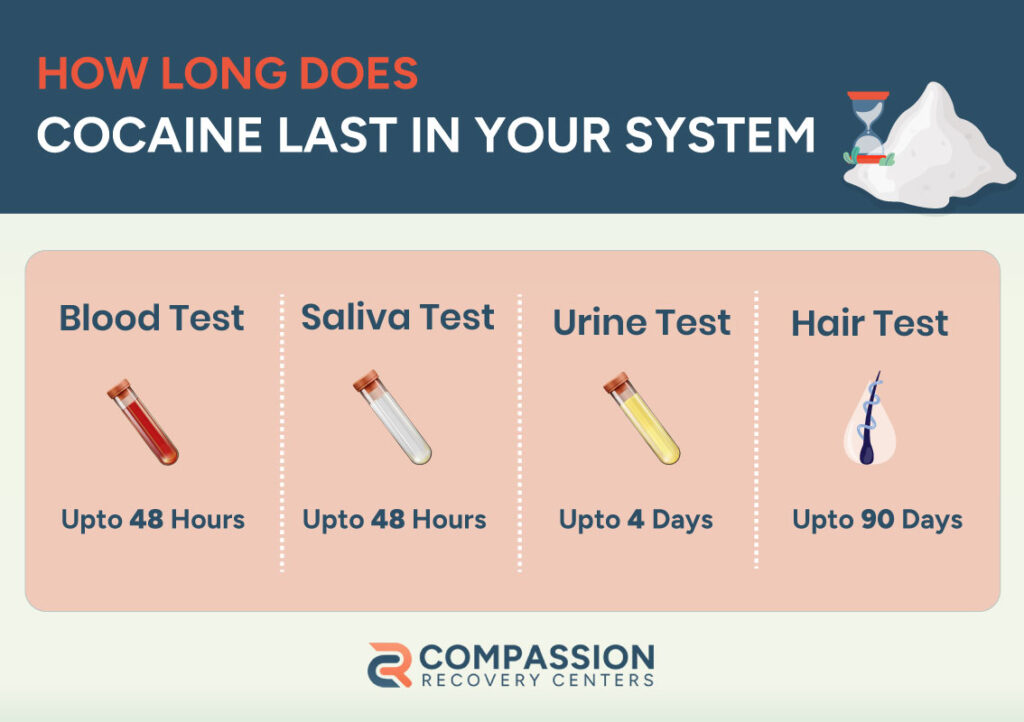Cocaine may last in your system from anywhere between two to four days, depending upon several key factors such as dosage, metabolism, level of addiction, and purity of cocaine. However, every case of cocaine in the system is different. To elaborate, this article will comprehensively cover all the aspects of:
- Duration of cocaine in the system
- Factors affecting its stay
- Effect on the body
- Cocaine testing and solution
If you are feeling unwell or having trouble keeping cocaine out of your system, let Compassion Recovery help you out! Contact (877) 414-3007.
How Long Does Cocaine Stay in Your System: Know the Organwise Timeline
With disastrous effects on the body, brain, and social life, you might be wondering how much time the cocaine will take to wash out before it leads to some unfortunate happening. However, your body processes cocaine differently due to various factors involved, as will be discussed below.
Cocaine Half-Life
Cocaine half-life is the time it takes to degrade half of its original dose when taken first. It has a plasma life of 1 hour. However, its stay and effects may span shorter or longer in organ-specific conditions and other contributing factors. Such as:
How Long Does Cocaine Stay in Your Urine
Due to the differential metabolic activity of the kidneys, cocaine may be detected in your urine for up to 4 days.
How Long Does Cocaine Stay in Your Blood
Blood is the first entry point for cocaine, and it may stay up to 2 days in the bloodstream.
How Long Does Cocaine Stay in Your Saliva
Saliva-based tests can detect cocaine for up to 2 days.
How Long Does Cocaine Stay in Your Hair
Hair follicles can contain cocaine for up to 90 days, depending on metabolic factors.
Factors Affecting the Stay of Cocaine in Your System
Organ-specific stay of cocaine may alter due to certain factors such as:
- The amount of cocaine taken and frequency of misuse
- The way cocaine is ingested, such as:
- Snorting can be felt for 3-5 minutes. lasting for 20 minutes
- Smoking and intravenous use can be felt for 5-10 seconds but lasts for 20 minutes
- Taking orally feels for 10-20 minutes and can stay for up to 90 minutes
- Body metabolism and mass index due to gender, age, and physical health
- Use of other substances, such as alcohol with cocaine
- The purity of cocaine used
Also, how the body processes it to cleanse alters the timeline of cocaine.

Does Cocaine Stay Longer With Other Substances?
Other drugs and alcohol bind with cocaine metabolites and increase their elimination time. Mostly, cocaine and alcohol are combined and misused, causing severe effects with longer periods of stay. Some of the research study states:
- Research conducted on dogs showed a 20% slower elimination time of cocaine when combined with alcohol
- Whereas rats also showed slower withdrawal time when cocaine was mixed with alcohol
Cocaine with alcohol produces a metabolite called cocaethylene, which increases cardiotoxicity effects.
Cocaine Mechanism of Action: How the Body Processes It
When entered, cocaine is broken down into smaller pieces called cocaine metabolites. It is metabolized by the enzymes of liver and blood. Cocaine’s main metabolites are:
- Benzoylecgonine
- Ecgonine methyl ester
When performing a drug test, the concentration of benzoylecgonine is measured, Which has a half-life of around 12 hours and can be detected in urine for up to 3 days.
How to Get Cocaine Out of Your System
Dr. Marco M Zahedi, gives an insight into some tips to get the cocaine out by:
- Getting support from a professional
- Resilient avoidance is possible via professional drug rehab
- Taking safe alternatives to cope with withdrawal at the start
- Drinking plenty of water to rinse out the system
- Medically supervised detox
These can be some of the suitable ways to get rid of cocaine from your system. However, consulting a physician regarding your condition is advised.
Get your question answered now.
Effects of Cocaine on the Body: Know What It Does if It Lasts!
Cocaine is a highly stimulant drug that hooks people right after the first hit. Therefore, its increased use to get high causes short and long-term side effects, as explained.
Short-Term Effects of Cocaine
These symptoms appear right after the cocaine intake such as:
- Risky behavior
- Agitation
- Restlessness
- Fever
- High blood pressure
- Increased heart rate
- Sweating
- Breathing problem
- Stroke
It can last till the cocaine is diffused into simpler metabolites.
Long-Term Effects of Cocaine
As cocaine is used over a period of time, cocaine addiction results in severe side effects such as:
- Higher risk of stroke and seizures
- Cardiac issues such as heart muscle inflammation, aortic rupture, and reduction in heart contraction
- Malnourishment
- Brain functioning impairment
- Breathing issues such as asthma, runny nose, and loss of smelling sensation
- Parkinson’s disease, HIV, and hepatitis risk
Seek immediate help from a drug rehab expert before it’s too late! (877) 414-3007
Cocaine Drug Test: What to Expect
Cocaine drug test is performed via blood, urine, saliva, and hair follicles as the cocaine metabolites are immediately present in these body parts. A drug test can be performed in a clinical setting, hospital, driving test, and on several other occasions. Some of the tests include:
- Gas spectrometry
- Chromatography
- Immunoassay
However, all the factors explained above can alter the drug screening result. If you or your loved one is having cocaine issues, consult our physicians to see how we can help you eradicate cocaine! (877) 414-3007
False Positive Detection for Cocaine: How to Avoid?
False drug testing is rare but possible due to similar metabolic reactions of other drugs on the immunoassay urine testing. Once, a 48-year-old man was rejected pain management therapy due to a false drug test for cocaine. The only way out of it is selective screening or getting your drug tested by multiple resources to ensure that the drug is not present in the system.
How to Pass a Cocaine Drug Test
Passing a drug test is not difficult as long as expert guidance is sought. Some of the steps you may take include:
- Take plenty of liquids
- Consult a drug rehab to eliminate the cocaine
- Get a diet plan from a nutritionist
- Get yourself tested from a drug rehab occasionally to ensure the body is out of toxic metabolites.
- Get a prescription for toxin-rid pills from an MD.
Seek immediate professional consultation if cocaine is disturbing your normal metabolism or if you want to get the cocaine out!
Cleanse Cocaine Out- Get Sober Today With Compassion Recovery!
Getting rid of cocaine requires patience and perseverance. Whether you have taken cocaine in the past or not, it is necessary to get yourself checked up if you have a job interview scheduled or any legal process involved. Compassion recovery will give you the appropriate cleansing therapy you need regarding cocaine withdrawal. We offer
Get yourself in touch with our drug rehab experts today! (877) 414-3007
Frequently Asked Questions About Cocaine
Some of your common queries regarding cocaine are addressed as follows:
Is Cocaine Addictive?
Cocaine is a highly addictive stimulant drug that causes euphoria, sense of pleasure, and increased energy levels. It is termed a scheduled II drug by the DEA. Due to its interaction with the brain reward system, it is considered an extremely dangerous substance as it also poses fatal withdrawals.
What Does Cocaine Do to Your Body?
Cocaine effects highly depend on the body’s metabolism. However, initially, a person may feel paranoia, hyper-sensitivity, or alertness. It can become fatal if overdosed or mixed with other substances.
Does Cocaine Make You Poop?
Cocaine, being a stimulant, causes sudden rises in energy and increases brain dopamine levels, resulting in increased bowel movement and nausea. This increases peristalsis activity of the digestive tract and makes you poop.
How Long Does a Cocaine High Last?
Cocaine high depends on certain factors such as metabolism, dose, and intake form. However, cocaine high may kick in as short as 3 minutes of intake to up to 2 hours.
How Long Does Crack Cocaine Stay in Your System
Crack cocaine produces sudden high effects but quickly vanishes from your bloodstream. However, it can stay in your urine for up to 4 days due to its metabolites. Crack cocaine has a half-life of 15 minutes and can be detected for 24 hours in the saliva.
Is Crack Cocaine?
Crack is made by cooking cocaine powder with baking soda and broken down into small pieces. It’s a high-potency drug that produces extremely high sensation and stimulation and stays for a longer period than cocaine.
1. DEA. (2000). Cocaine. Dea.gov. https://www.dea.gov/factsheets/cocaine
2. Famularo, G., Polchi, S., Giacomo Di Bona, & Manzara, C. (2001). Acute aortic dissection after cocaine and sildenafil abuse. The Journal of Emergency Medicine, 21(1), 78–79. https://doi.org/10.1016/s0736-4679(01)00345-6
3. Abuse, N. I. on D. (n.d.). Cocaine | National Institute on Drug Abuse (NIDA). Nida.nih.gov. https://nida.nih.gov/research-topics/cocaine#short-term
4. Moeller, K. E., Kissack, J. C., Atayee, R. S., & Lee, K. C. (2017). Clinical Interpretation of Urine Drug Tests. Mayo Clinic Proceedings, 92(5), 774–796. https://doi.org/10.1016/j.mayocp.2016.12.007
5. Preston, K. L., Epstein, D. H., Cone, E. J., Wtsadik, A. T., Huestis, M. A., & Moolchan, E. T. (2002). Urinary Elimination of Cocaine Metabolites in Chronic Cocaine Users during Cessation. Journal of Analytical Toxicology, 26(7), 393–400. https://doi.org/10.1093/jat/26.7.393
6. Laizure, S. C., Mandrell, T., Gades, N. M., & Parker, R. B. (2003). Cocaethylene Metabolism and Interaction with Cocaine and Ethanol: Role of Carboxylesterases. Drug Metabolism and Disposition, 31(1), 16–20. https://doi.org/10.1124/dmd.31.1.16
7. Hedaya, M. A., & Pan, W. J. (1996). Cocaine and alcohol interactions in naive and alcohol-pretreated rats. Drug metabolism and disposition: the biological fate of chemicals, 24(7), 807–812. https://pubmed.ncbi.nlm.nih.gov/8818580
8. Kim, J. A., Ptolemy, A. S., Stacy, Janfaza, D. R., & Ross, E. L. (2015). The Clinical Impact of a False-Positive Urine Cocaine Screening Result on a Patient’s Pain Management. Pain Medicine, 16(6), 1073–1076. https://doi.org/10.1111/pme.12265
Did You Know? According to WHO, one out of every seven teens is struggling with some sort of mental illness.










